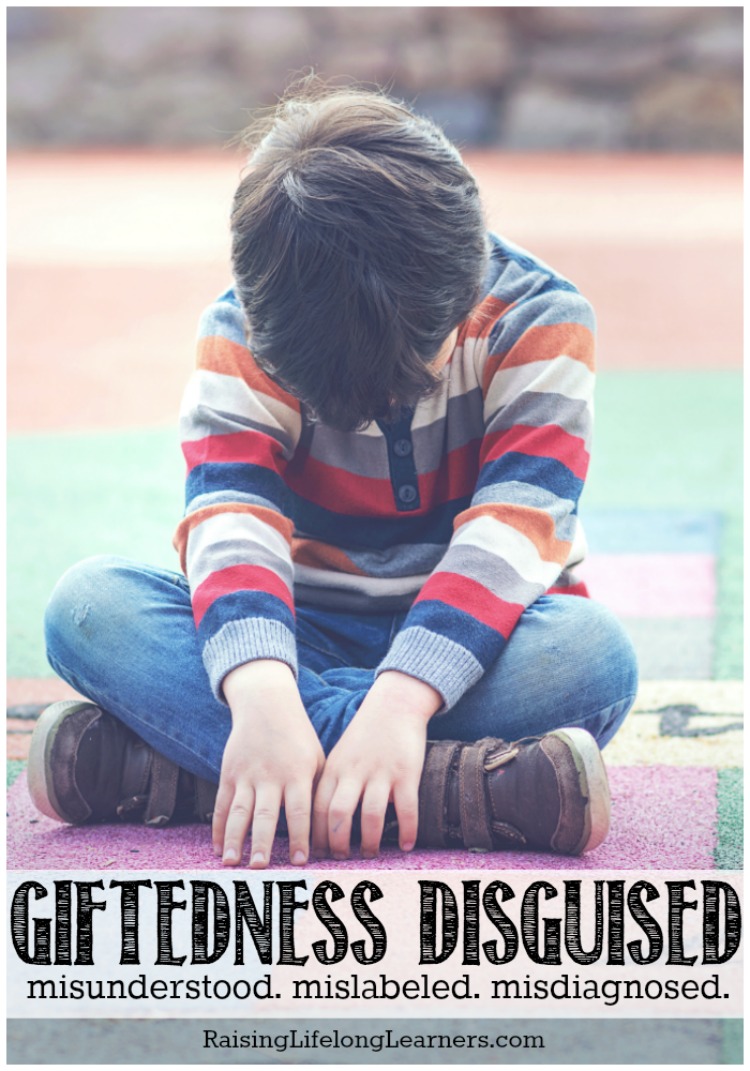When Your Child’s Giftedness Is Disguised
School was going to be amazing for my son. I just knew it. He was a thinker. A tinkerer. A doer.
He loved learning and had an insatiable thirst to know everything about everything. Always asking questions. Always starting a project. Always wowing those he met with his big thoughts.
And then school — and the talks — started.
Talks with teachers about how to get that active thinker to sit still and just focus, for goodness sake.
Talks about assessments.
Labels.
Diagnoses.
Medication.
And I was lost and despairing.
It didn’t matter that I had spent the better part of a decade working with differently-wired children, or that I had a master’s degree in gifted education, or even that I knew in my heart that the teachers and guidance counselors were wrong. I trusted that those who spent their days educating my kid knew what they were talking about and I listened.
I’ve never regretted anything more than I do my son’s first grade year.
You see, giftedness is not an in-your-face, cut-and-dry, easy-to-administer “diagnosis.” Nope; giftedness is a world full of paradoxes.
It’s the brilliant daydreamer who can see all the sides of an issue and pinpoint exactly how and where things went wrong, while coming up with the perfect way to solve the previously unsolvable problem.
It’s the test taker who can’t answer a simple question like, “what does a doctor do?” because there are just too many different types of doctors, each with very different specialties and skill sets.
It’s the four year old curled up with a book larger than himself who can’t tie his shoes, has his pants on backwards, and doesn’t remember to use the toilet without being told.
It’s the kid who keeps falling out of her seat, tearing up little pieces of paper, bouncing up and down, and talking out of turn (again and again) in the back of the classroom — all while understanding exactly what’s going on.
When Your Child’s Giftedness Is Disguised
It’s the argumentative tween who can’t seem to find any of his schoolwork or write a complete sentence, but can discuss quantum physics with great enthusiasm.
It’s the kiddo who is not cutting it in the regular classroom because transitions cause an unreasonable amount of anxiety to well up in her chest and so she melts down before class even begins, but can’t exactly explain why.
It’s the sweet eleven year old who was just recommended for the district’s “behavioral” school because the school staff focuses on the times he’s disregulated, instead of the amazing progress he’s made over the course of the year through the accomodations his team has put into place.
Giftedness is so often disguised in our brightest kiddos.
And it’s no wonder… the Council for Children with Behavioral Disorders tells us that IDEA defines emotional disturbance as:
- An inability to learn that cannot be explained by intellectual, sensory, or health factors.
- An inability to build or maintain satisfactory interpersonal relationships with peers and teachers.
- Inappropriate types of behavior or feelings under normal circumstances.
- A general pervasive mood of unhappiness or depression.
- A tendency to develop physical symptoms or fears associated with personal or school problems.
The CCBD goes on to explain that children with an emotional disturbance may show these characteristics:
- Hyperactivity (short attention span, impulsiveness)
- Aggression or self-injurious behavior (acting out, fighting)
- Withdrawal (not interacting socially with others, excessive fear or anxiety)
- Immaturity (inappropriate crying, temper tantrums, poor coping skills)
- Learning difficulties (academically performing below grade level)
These are the very same characteristics that many checklists suggest may indicate giftedness, especially when a child is gifted with a concurring disability, or twice-exceptional.
Gifted kids:
- argue or debate situations and fairness.
- exhibit signs of existentialism and often depression.
- show signs withdrawal or aggressive behavior due to boredom.
- fail to complete work because of distractions.
- exhibit signs of fear, possibly stemming from perfectionism.
An article written for SENG (James T. Webb, Edward R. Amend, Nadia E. Webb, Jean Goerss, Paul Beljan, F. Richard Olenchak) states, “Many gifted and talented children (and adults) are being mis-diagnosed by psychologists, psychiatrists, pediatricians, and other health care professionals. The most common mis-diagnoses are: Attention Deficit Hyperactivity Disorder (ADHD), Oppositional Defiant Disorder (OD), Obsessive Compulsive Disorder (OCD), and Mood Disorders such as Cyclothymic Disorder, Dysthymic Disorder, Depression, and Bi-Polar Disorder. These common mis-diagnoses stem from an ignorance among professionals about specific social and emotional characteristics of gifted children which are then mistakenly assumed by these professionals to be signs of pathology.”
Contrary to popular myths and misunderstandings, gifted kids (and adults) are not just the answer-givers, rule-followers, and quiet reflectors. They are also the challengers, rule-breakers, contradictors, and vocal opposition to the status quo. They can be trouble makers and rabble rousers.
And they’re exhausting to parent and teach.
And this last point is perhaps why our schools, and society in general, are so quick to pathologize them. To cut them down. To make them — and their parents — think something is wrong with them.
I regret my son’s first grade year.
So very much.
I regret that I didn’t stand up from the beginning, trusting myself that I was right and he wasn’t a candidate for medication. That it wasn’t ADHD we needed to cure him of.
That his differently-wired brain was exactly as it was meant to be. That he needed to move and think and engage and do — all day long, and that it was the system that was flawed.
I regret that I didn’t fight harder or sooner for him.
And I regret that I didn’t pull him to homeschool earlier in the year.
More than anything, though, I am heartbroken for all the other misunderstood, mislabeled, and misdiagnosed gifted kids that are struggling right now. Those whose giftedness is being disgguised by behaviors, meltdowns, and the pathologizing of differently-wired kids. I am heartbroken that there are brilliant minds slipping through the cracks every single day because schools aren’t equipped to serve them. Teachers aren’t taught to see them. Administration isn’t trained to understand them. And special needs staff aren’t prepared to accomodate for them.
And I’m sad that there are still so many moms and dads who think they’re doing something wrong. That there’s something wrong with thier parenting. That there’s something wrong with their kiddo.
There’s not.
They’re not.
YOU’RE not.
If there’s one thing that I think every single mom and dad needs to know and cling to, it’s this: You know YOUR child. You are the perfect parent for him. For her. You have all the tools you need to advocate, support, and raise your child. Be confident.
Whether that means you’re up at the school fighting for the perfect education, you’re enrolling your kiddo in a specialized private school, or that you’re eschewing traditional school models altogether and bringing your kiddo home, you have this. You CAN do this.
You KNOW your child.
Your gifted child can shed the disguise and shine — learning, questioning, and creating — just as he was meant to do.
For more information on Gifted Kids, Check Out:




